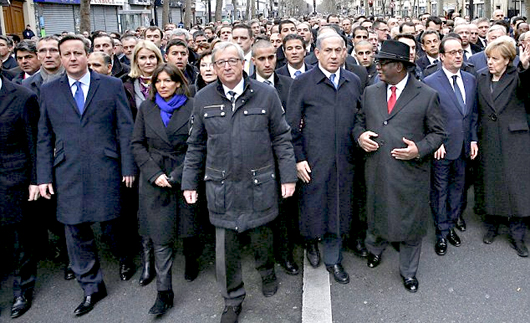
Paris, Jan 12: World leaders, including some who are normally implacable foes, on Sunday linked arms — leading more than a million French citizens — in unprecedented scenes of solidarity during a historic march against terrorism in Paris.
Walking arm in arm alongside President Francois Hollande were a string of leaders including British Prime Minister David Cameron and German Chancellor Angela Merkel. They were joined on the front line by arch nemeses Israeli leader Benjamin Netanyahu and Palestinian President Mahmud Abbas, who were positioned just four people apart.
Also present were Ukrainian President Petro Poroshenko and Russian Foreign Minister Sergei Lavrov, whose countries are engaged in a violent struggle in Ukraine.
“Paris is the capital of the world today,” said Hollande before the march, which attracted hundreds of thousands to the streets of Paris and many more across the rest of France and Europe.
Before he set off for the march, Britain's David Cameron said: “We in Britain face a very similar threat, a threat of fanatical extremism.
“It's a threat that has been with us for many years and I believe will be with us for many more years to come,” he said.
Some 2,200 police and soldiers patrolled Paris streets to protect marchers from potential threats, with police snipers on rooftops and plain-clothes detectives mingling with the crowd.
City sewers were searched ahead of the vigil and underground train stations around the march route were closed down.
Seventeen people, including journalists and police, were killed in three days of violence that began with a shooting attack on the weekly Charlie Hebdo known for its satirical attacks on Islam and other religions as well as politicians.
It ended on Friday with a hostage-taking at a Jewish deli in which four hostages and the gunman were killed.
The silent march — which may prove the largest seen in modern times through Paris — reflected shock over the worst militant Islamist assault on a European city in nine years. For France, it raised questions of free speech, religion and security, and beyond French frontiers it exposed the vulnerability of states to urban attacks.





Comments
Add new comment